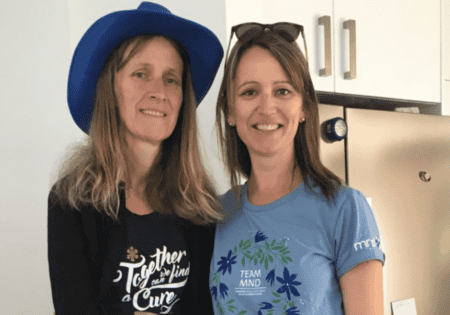Turning insights into change: how the MND Insight Research study is already making a difference
Advocacy, Community, Research
20 October 2025

Research is essential for improving the lives of people with motor neurone disease (MND) and their whānau. It shows us what works, what doesn’t, and where changes are needed in care, services, and support.
That’s why Motor Neurone Disease NZ is committed to ensuring that research continues to be a priority — not just for clinicians and scientists but for everyone affected by this disease.
The launch of the MND Insight Research study marked a pivotal step in this journey.
Introduced in early 2025, the MND Insight Research is the most comprehensive study of its kind in Aotearoa New Zealand. It was designed to answer critical questions about what’s working well, where gaps exist, and how we can best advocate for improvements.
The study is led by our Research Advisor and Best Practice Advocate, Dr Natalie Gauld, with support from academics, neurologists, and other health professionals. Natalie was diagnosed with Amyotrophic Lateral Sclerosis (ALS) in 2022 and brings deep expertise as a researcher, health professional and lived experience.
Nearly 300 people — including individuals with MND, their family carers, and bereaved family carers — shared their experiences and needs across a wide range of topics, including:
- Time to diagnosis and satisfaction with the process
- Hours of care provided, and the physical and emotional toll on carers
- Access to genetic testing
- Home modifications and delays in equipment deliveries
- Availability of mobility aids
- Mental health support
- Quality of life
- Financial impact of MND
Thank you
We are deeply grateful to everyone who took part in this study. We know that completing the survey was physically and emotionally demanding — whether you’re living with MND, supporting someone who is, or grieving the loss of a loved one.
The insights and lived experiences you shared are not just valuable — they’re essential. They’re being used to advocate for change in management, care and support, and access to equipment and treatment.
Your courage and generosity are guiding our work, keeping focused on what matters most.
What did we find out?
The study reinforces what our Support Advisors witness every day: people living with MND — and their whānau — face far more than the disease itself. Many navigate exhausting delays, unequal access to care, and relentless pressure. We know these barriers erode dignity and diminish quality of life, and the evidence from this research will help raise awareness among funders and providers of the needs of the MND community.
At the same time, the study highlighted examples of coordinated, timely care. These moments show the difference it makes when systems respond well and the unique needs of people with MND are met.
In areas for improvement, the study examined diagnosis time and satisfaction. It identified common themes contributing to delays, and this anonymous data will help advocate for faster, more accurate diagnoses.
The study also explored incidents of falls, including serious injuries from falls and falls caused by delays in equipment or house modifications. These anonymous accounts offer powerful, undeniable evidence in the call for timely improvements that truly help make time count.
What are the next steps?
With the research complete and results analysed, a substantial report is now in progress — spanning 60,000 words, 173 pages, 132 graphs, and 51 tables.
This report is precious taonga. It offers robust data, deep insight, and academic-level evidence to drive change across every stage of the MND journey.
While the full report remains out of the public domain, Dr Natalie Gauld and the research team are publishing topic-based findings in peer-reviewed academic journals. This approach helps us to deliver the best impact for the MND community. It ensures the insights are accessible to health professionals and researchers for years to come, while also building credibility with policymakers and the wider health sector.
Publishing findings in these academic journals require that the information has not already been released publicly. We will share the information on this page as each research paper is published over the next year.
The first paper, focused on the use of riluzole (Rilutek) in New Zealand, was published in the New Zealand Medical Journal (NZMJ) on 30 January 2026.
This strategic, topic-based robust approach to disseminating the information allows us to equally highlight the significant challenges across each theme piece-by-piece so they can get the attention that each deserves.
Webinar to share insights with the MND community
In September 2025, we hosted a webinar presented by Dr Natalie Gauld and MND NZ Chief Executive Mark Leggett, sharing a summary as feedback to participants from the study. Due to its popularity, we held a second session in October 2025.
To request a copy of the webinar recording, please email .
Engaging with funders, equipment providers, and researchers
Motor Neurone Disease NZ is actively engaging with funding and equipment providers, building collegial partnerships to help make time count for people with MND.
This includes targeted presentations and sharing relevant, anonymous data from the Insight Research. By providing reliable information, we’re building trust and challenging service and funding policies to improve access and delivery.
In September 2025, the research findings on sleep in MND were presented at the MND Australia Care Forum, and a poster on equipment use was displayed at the PACTALS 2025 conference.
Further consultation with key stakeholders is planned over the coming months. We’ll continue sharing findings with health professionals — through webinars, forums, and direct engagement — as well as with government departments, funders, and equipment providers.
Our advocacy will be supported by publishing papers in peer-reviewed journals. These papers will be listed below as they are published.
Applying insights to our work at Motor Neurone Disease NZ
The MND community is at the heart of everything we do. These insights allow us to speak with one proactive, dignified voice that reflects the experiences of people affected by MND.
The findings serve as powerful reminders of what matters most. They guide our advocacy, research, education, and support services — and help bring MND into the national conscience through awareness and storytelling.
To share your story and help highlight the unique challenges of MND, please email .
MND Insight Research study team
We thank Principal Investigator Dr Natalie Gauld, MND NZ Research Advisor and Best Practice Advocate, and the research team for their time and expertise.
- Dr Jo Hikaka, Senior Lecturer, Te Kupenga Hauora Māori, University of Auckland.
- Associate Professor Stephen Buetow, Department of General Practice, University of Auckland.
- Dr James Cleland, Neurologist, Tauranga Hospital, Honorary Senior Lecturer University of Auckland, Medical Adviser MND NZ.
- Dr Sarah Buchanan, Neurologist, Health New Zealand, Southern; Senior Lecturer, Department of Medicine, University of Otago.
- Dr Sandy Rutherford, Occupational Therapist, Project Manager, Person Centred Research Centre, Auckland University of Technology.
- Dr Julienne Faletau, Pacific Principal Analyst Team Lead, Pacific Public Health & Intelligence Directorates, National Public Health Service.
- Tamzin Brott, Chief Allied Health Scientific and Technical Professions Officer, Hospital and Specialist Services – Waitematā.
- Professor Chris Frampton, Statistician, University of Otago, Christchurch.
MND Insight Research study funding
This research is funded by the Health Research Council, Motor Neurone Disease NZ, and Dr Natalie Gauld, with voluntary time from the research advisors.
How we’ve used the findings so far
All responses are anonymous, and findings are presented as summarised information to protect privacy of everyone involved.
Insights have been used for:
- Consultation on the NZ Disability Strategy (September 2025)
- MND NZ community webinar (September 2025)
- Ongoing engagement with Accessable and Enable regarding funding for equipment and house modifications
- Summary results on diagnosis, genetic testing and Bipap use shared confidentially with the International Alliance of ALS/MND Associations, for assisting with research and guidelines being developed July 2025
- Research poster presented on the use of assistive technology for people with MND in New Zealand at PACTALS Conference, Melbourne (September 2025)
- Findings on sleep for people with MND in New Zealand presented at the Motor Neurone Disease Australia Care Forum, Melbourne (September 2025)
- Upcoming presentation at the International Alliance of ALS/MND Associations Conference, Toronto (November 2025, Virtual)
- Gauld, N., Leggett, M., Buchanan, S., Cleland, J., Brott, T., Rutherford, S., Faletau, J., Buetow, S., Hikaka, J. Conducting comprehensive MND research to support activities of Motor Neurone Disease New Zealand (MND NZ).
Published papers from the MND Insight Research study
Links to published papers will be added as they become available
- Riluzole use paper published in the New Zealand Medical Journal (NZMJ) – 30 January 2026


